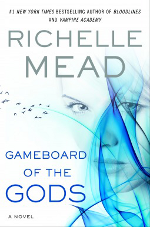
 As a newcomer to Richelle Meads’ work, the thrilling premise of Gameboard of the Godsdrew me in. A science fiction novel grounded in suspense and intrigue, Mead kept me turning page after page. Though occasionally predictable, Mead weaves a story which is truly entertaining. The stage is set in Mead’s fully developed world with eerie realism which captivates the reader.
As a newcomer to Richelle Meads’ work, the thrilling premise of Gameboard of the Godsdrew me in. A science fiction novel grounded in suspense and intrigue, Mead kept me turning page after page. Though occasionally predictable, Mead weaves a story which is truly entertaining. The stage is set in Mead’s fully developed world with eerie realism which captivates the reader.
The first installment of Richelle Mead’s Age of X series has all the elements that have made her bestselling Vampire Academy and Bloodlines series such mega-successes: sexy, irresistible characters; romantic and mythological intrigue; and relentless action and suspense.
In a futuristic world nearly destroyed by religious extremists, Justin March lives in exile after failing in his job as an investigator of religious groups and supernatural claims. But Justin is given a second chance when Mae Koskinen comes to bring him back to the Republic of United North America (RUNA). Raised in an aristocratic caste, Mae is now a member of the military’s most elite and terrifying tier, a soldier with enhanced reflexes and skills.
When Justin and Mae are assigned to work together to solve a string of ritualistic murders, they soon realize that their discoveries have exposed them to terrible danger. As their investigation races forward, unknown enemies and powers greater than they can imagine are gathering in the shadows, ready to reclaim the world in which humans are merely game pieces on their board.
Mead’s world is truly the core of Gameboard of the Gods; a world which plays on the concept of ideal. The concept of genetic manipulation is not a new one in science fiction but it was Mead’s execution of this in her world which made it so fascinating. Mead creates a culture of genetic ‘ideal’ where the majority of individuals have desirable traits cherry picked from different ancestries to create the new normal. The minority are people who are self segregated into genetically ‘pure’ cultures. These all takes place in a new formed Republic of Unifies North America. It is a true testament to Mead’s writing that I immediately started picking apart her universe for how realistic it was. I started asking myself in what society and circumstances would Canada and parts of the United States merge and how a culture of praising this unified country prevail. I still don’t know in what circumstances that would happen, in fact I don’t think it ever would, but the beauty is that Mead’s storytelling made me wonder. Gameboard of the Gods had such a realistic future that I question it like a photographer criticizing cgi.
The world isn’t Mead’s only strength; the realistic aspects of each character is incredibly prominent. My favorite character is Mae Koskinen, the Nordic warrior at the core of the story. Her development over the course of Gameboard of the Gods is truly realistic. Mead shows us a woman who is strong but still feels, her icy exterior simply her form of professionalism. The adventure which unfolds, makes Mae truly evolve, and at some points, choose not to. This synergy made her relatable and genuine- two rare qualities in a potential romantic interest let alone a main character.
Despite the thoroughness of Mead’s world building, much of the information isn’t shared early enough. While reading, I initially felt somewhat puzzled, wondering many more questions than were answered and leaving many things to be assumed. The perfect example of this was when characters went to Vancouver and I internally thought ‘Oh! So they’re in Canada’ only to be once again confused when they mentioned Utah. Though this was eventually explained, I wish I was clued in a bit sooner as my curiosity found it distracting to the storyline. Something as simple as typing out Republic of United North America instead of the acronym RUNA sooner than a third of the way through, would have served to sate my curiosity at least temporarily.
Mead showed a whole different side of herself when she wrote passages of sex scenes. The attention to detail made me wish she had carried this over to the other action based scenes such as combat. Overall, her writing pace was quite comfortable- not too fast nor too slow. However, there was a slightly odd imbalance of time. Some chapters were completely isolated and set in an alternate time period. While I enjoyed Mead’s mysterious clue based layering style, it felt at odds with the out of time vignettes. I love the concept of making a reader connect the dots but I don’t think one of those should be ‘Oh, that was in the past?’. For me, there are few instances where a reader doesn’t need to know that a chapter is out of the timeline of the plot and Mead’s did not fall into that category.
Throughout, Gameboard of the Gods is an entertaining investigation adventure. With science fiction elements that are hauntingly extreme yet sensible, Mead creates a world full of experiences and questions for reader and character alike. Gameboard of the Gods entices veteran scifi fans and newcomers alike, mixing fantasy elements such as mythology and a vague post apocalyptic air. Despite occasionally predictable tie ins and plot twists, Gameboard of the Gods holds true as enjoyable and thought provoking, ultimately becoming a book I would recommend to many a friend.

I’ve heard some mixed reviews about this one, and most of what I’ve heard from the more negative reviews is precisely what you said about the story being somewhat predictable. I’m still curious to read it in spite of that, though.